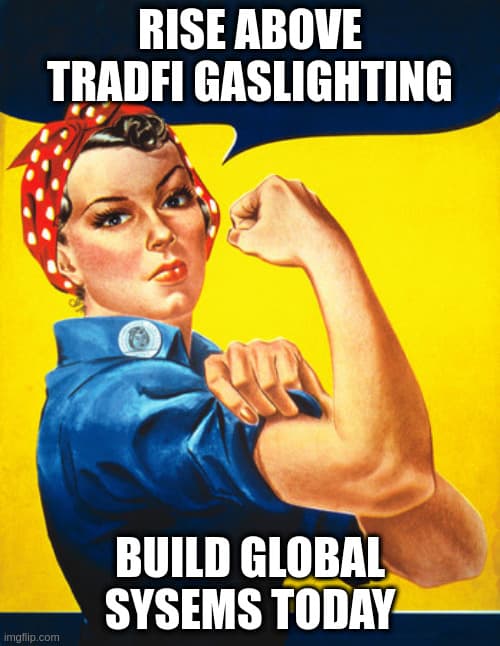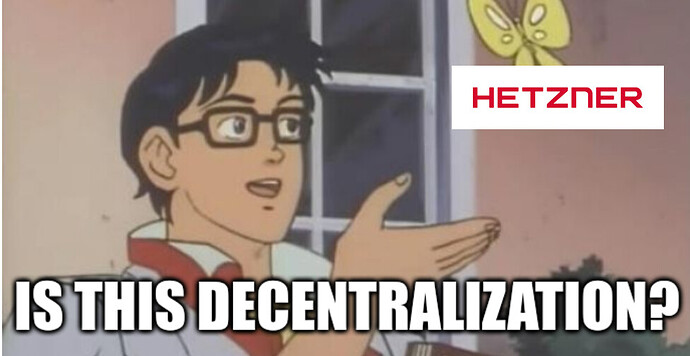Decentralized crypto needs you: to be a geographical decentralization maxi
In this post, we take a look at trends in MEV that we believe have the opportunity to centralize and weaken the core mission and value proposition of cryptocurrency. We argue that the most important only exit from a future where power dynamics in cryptocurrency become centralized and predatory is through geographic decentralization. We then explore the relationship between geographic decentralization and privacy, which in our opinion will be a dominant economic phenomenon in the next decade of MEV evolution.
We call on the community of decentralization advocates and developers to help us achieve a future where the beating, global, permissionless heart of cryptocurrency is protected.
Why Geographic Decentralization?
We believe that the single most important exit from a centralized cryptocurrency future is geographic decentralization. Here are a few reasons why:
- Regulations
We have seen across a number of jurisdictions in a number of ways, local regulatory regimes attempting to impose their will, and often censorship onto blockchain ecosystems. It is daft to expect that in the future, these forces will have no impact on the technology we build. In order to build a conscious, decentralized, permissionless system that works, it must be global. Expecting a system that exists within the context of a single set of peoples' utility functions, to supercede the utility of just that set is an obvious fallacy. How can we claim to be decentralized or permissionless if we not truly global?
- "Neutrality"
There is a lot of talk about neutrality in cryptocurrencies. But, in a system with a bias towards one region, how can you possibly claim to have any notion of neutrality? In my analysis, it seems unlikely that those in disaffected regions would agree. So, some notion of global fairness intuitively also seems important to defining "neutrality".
- Building Global Systems
Many of the goals of cryptocurrency are inherently global in nature: providing an alternative to existing financial regimes, allowing cross-border financial flows, providing financial freedom and access to those disaffected by the walls of privilege in the current financial system, and more. Building systems that trend towards locality runs directly counter to many of the goals that brought us all here, that we have promoted as ideals, and that we have all been building towards for years.
- Consensus Safety
A more technical and rational argument for a global power distribution is simply in the technological robustness of the systems we provide, from the point of view of safety and availability. The stated half-serious goal of Ethereum product design is to survive a nuclear war. It should be obvious why when reasoning about extremes and black-swan events, having a global system becomes extremely attractive.
- "Fairness"
One of our aspirational goals as a cryptocurrency community is surely to build systems that are fair for users. While, like with neutrality, we may disagree on exactly how this translates into a technical definition of fairness, we all have notions of unfairness that we know when we see them. A system that privileges certain geographies over others, in which simply inhabiting a space in the physical world provides outsized returns, surely cannot be claimed to be "fair". Of course, we exist in the broader context of a centralized world, so there will always be some advantage of privileged geographies. But it is on us as technologists building for the world to reduce, not aggravate, these effects.
- Decentralization
One of the core market theses of decentralization is that the sum is always more than the parts. Build systems in which the sum can be expressed rather than stifled. Build bridges, not walls, protocols, not infrastructure. If the world is benefited by the systems we build, these network effects and the cooperation they enable forms the core of the bull case for cryptocurrency. Our existing nation states, technocrats, and economies have created systems that interoperate over walls. These systems fail to achieve the true promise of global participation or network effect. Let's not follow in their footsteps.
What is Geographic Decentralization?
So, hopefully we are on the same page that geographic decentralization is not just great, but critical. But what does this mean? We all say we care about "decentralization", fail to define it, and go to Twitter-war with each other over who is more decentralized than whom. To avoid that, it helps to have some shared notion of what this actually means.
At the most abstract level, I believe there are several fundamental truths.
- The only decentralization that matters is decentralization of power.
- "Architectural" or "technical" decentralization will arise if power is decentralized.
- Therefore, it should be a goal of "technical" decentralization to serve and protect decentralization of power.
- Decentralization of power must be global.
If the mission of technical decentralization is to allow for a world of well-distributed power, how can we design our technology to be aware of this? We can define geographic decentralization in terms of incentives:
Definition 1: Let P be some rational player in our game. Let x be the profit they will make from running the protocol, with some latency distribution to all other players. Let x' be the profit they would make from running the protocol if they have ε (minimum) latency to other players. Your protocol supports geographic decentralization if x and x’ are maximally similar (their percent difference is low).
To further tighten the definition, you can define both x and x' in terms of the MEV game, as well as analyzing quantitative data on validator profits in both the general system and MEV game across different latency distributions.
What is the intuition behind this definition? Simply, to be global, a protocol must be minimally latency sensitive. If it is ultra rational to optimize your latency to other players, it is not rational for players who are far away to play the game. They may instead design their own games where they too have outsized advantage over others, or may be forced to pay rent to or colocate with existing players, centralizing the power and therefore the meaningful decentralization of your network into a single domain.
This is especially troubling when you consider the existing power dynamics of finance and global power; the incentive to colocate already exists simply through the distribution of world power, and turbo-charging it by providing additional outsized incentives to do so will do crypto no favors in achieving its decentralized, permissionless, global potential.
This definition gives us something to be maximalists about! Designing a system where actors can participate in any geography certainly seems like a more unifying goal for all decentralized systems than eating meat or hating on smart contracts, surely?
Threats to Decentralization
As we have all learned from Bitcoin, maximalists are defined as much by what they hate as by what they embrace. So while we are all for geographic decentralization, can we unite on a realistic landscape of factors in the world today that threatens our decentralized global utopia? There are a few non-exhaustive ones that keep me up at night:
- Cross-domain MEV
As we have shown in a cursory initial analysis of the forces at play in cross-domain, multi-domain, and bridge MEV, there are highly centralizing forces that exist when more centralized trust domains co-exist and hold financial values in decentralized trust domains. Specifically, there is an effect here where the bad drives out the good: if there is one system that has an extremely centralized or geographically concentrated power distribution, arbitraging that system against any other system requires a similar geographic advantage to be effective. Thus, the more activity occurs on centralized trust domains, the more the geographic decentralization of a network is eroded, even if that network is designed intentionally. We must do our best to therefore promote user activity and asset exchange on domains that are decentralized, and in which the incentives to interoperate without centralization are clear.
- Existing power dynamics
To make the above even more alarming, it suffices to consider power dynamics in proof-of-stake. With an increasingly bimodal exchange market, and many centralized players and centralized trust domains emerging, it is likely that existing power dynamics will translate into the blockchain space. We must specifically work to ensure that global access to these systems is protected in the face of these powerful, centralizing incentives. There are many players who wish to own the financial system; unfortunately, in doing so, the financial system becomes far less effective than if we succeed in building cooperation. We must therefore ensure at minimum the rights of new worldwide entrants in a system where entrenched power is very much the reality. Failing to do so means that all our efforts amount to nothing more than entrenching existing power norms.
- Latency games
The incentive to optimize for latency in existing cryptocurrencies is far less profitable than in trad-fi today, due to the lack of a single central source of power. That being said, it is not zero, and any incentive to optimize for latency translates under our definition to a direct centralizing pressure on a system's geography. We must design our protocols, auctions, user transactions, dapps, and more to avoid exposing outsized rent in the face of micro-latency optimizations. This is a brand new challenge in consensus design, and in my opinion will be one of the most important problems in the next ten years of consensus protocol research. In practice, let's use and evolve PBS to set the standard for fair MEV market structure in a globally-aware manner.
- Regulatory capture
We live in a regulated world, and it is important to develop systems for the context in which they must survive and exist. Regulations often create regulatory silos, through allowing for interoperability and exchange, but only under a limit set of highly specific and geographically tailored rules. These silos will increasingly pose pressure on any global systems, with friction occuring at the interfaces. We must therefore be mindful about the interfaces we design, or these silos can easily override and destroy the value of any global systems we build.
- Centralized MEV infrastructure
Lastly, one of the fundamental centralizing forces in all of cryptocurrency, and the embodiment of the pressure on geographic decentralization we describe, is the MEV game. If MEV infrastructure is centralized, then the beating core of incentive optimization in cryptocurrency remains centralized. We have made great strides towards a truly decentralized MEV game recently, but major hurdles still remain. Centralized builders and relays dominate the market, creating pressures on geographic decentralization and often centralization pressures on the network as a whole. We must therefore make sure that every action we take applies pressure on the MEV game to become more decentralized. Build global infrastructure, not features or hyper-financialized games that benefit those with existing geographic privilege.
Being a good geographic decentralization maxi requires being conscious of the forces at play, while designing systems that do their best to achieve geographic decentralization in the context in which they exist.
Is doing nothing enough?
There may be an argument that geographical decentralization and therefore all the wonderful properties that come with it already exist in cryptocurrency. After all, crypto users are spread around the world, as are validators, and exchanges. We witness a bimodal exchange market with two major players, one targeting the US geopolitical axis and the other seeking regulatory arbitrage outside it.
Perhaps the status quo is not so bad, and we can abandon our maximalism for cooperation?
Unfortunately, the truth is not so simple. In a constantly evolving dynamic game, it is not sufficient to assume the status quo as an axiom. Tradfi too has users and venues across the world, and has nonetheless chosen geographic and regional clustering as an approach. The validator set of cryptocurrencies is dynamic, and the very incentives we are defining here determines who validators will be in the future.
Assuming either users or validators will remain globally distributed when there is no incentive for them to do so seems optimistic, indeed.
Two case studies highlight our point, and show the dangers of design choices on geography and decentralization. The first are low latency L1s, whose technical architecture choices are well known to have concentrated their validators, as a design choice, into a handful of datacenters. It is unlikely these systems will achieve global reach when the dust settles, as they will undoubtedly be subject to the rules and policies of the venues in which they are hosted, which here are rather limited.
The second are single sequencer L2s, many of which feature a timing game if they do not currently carry a MEV auction. These systems have already seen the power of incentives in centralizing their searcher market to those with a peered connection to a single sequencer, in the limit. The negative externalities of this behavior have at least one network considering a change for stability, and this is before you even consider the long-term fragility of a system built with a single geographic, logical, and technical chokepoint.
Optimizing for Centralization
We therefore argue that, as an L1 protocol designer, optimizing your protocol for latency is akin to optimizing for centralization. This does not mean this optimization function may be useless; in many permission deployments, L2s, sidechains, etc., these intentional trade-offs can form an important part of product strategy. In many cases, full geographic decentralization may not be feasible or even desirable (imagine a global CBDC?). However, sweeping these trade-offs under the rug remains insufficient.
For centralized exchanges, for systems intended to serve one specific geography or one specific regulatory regime over others, there are obvious advantages to geographic centralization. The call in the article title is therefore a joke; obviously, not all systems will be global in scope and ambition, and geographic decentralization will be less important or far simpler to reason about for those. Many systems may also not exist in a permissionless or rational context, making their incentives easier to reason about and therefore decentralization easier to achieve than for something like a global L1.
For these systems, a more relaxed model of reasoning about geographic distribution and decentralization may be appropriate. For global systems, however, the potential of cooperation unlocked when a system transcends the power realities of any one geography will make it a powerful force indeed. It is our belief that, if your target is a global system, you must design and protect a global system, or lose to those willing to do so.
Decentralization Utopia; WHY?
So, we've heard a lot of doom and gloom about why we need geographic decentralization, why without it we will end up rebuilding a world of walls, and why our permissionless systems must be smart about existing power dynamics to achieve their potential. But what about the bull case? There are a lot of exciting arguments to be made for achieving this property.
Let's imagine a utopia where we have achieved geographic decentralization, and actors all around the world are empowered to participate. We can now hold up cryptocurrency as the gold standard of how to build empowering, robust, global systems, systems that carry meta-properties that supersede the will of any individual players. Cooperative systems like this have never been achieved, especially in highly financialized contexts where trust is scarce. In fact, you could even argue that the realities of geography, power, and trust force exchanges to a single location, where they can use their centralized power to build the trust of the masses.
Providing an alternative to this is the core value proposition of decentralization cryptocurrency, and this will be our adoption strategy. We must take existing systems and highlight their unfairness by being intentional about what we are building towards. And there is no better way to do this than to ensure that actors all around the world are empowered to contribute to the system, and to ensure that the critical infrastructure on which we all rely escapes the fragility of any single geography. In doing so, we will unlock the value of global cooperation across silo'd financial assets, with a wave of value creation that will be impossible to ignore.
This is our dream for the space, and it starts today, with protecting geographic decentralization and therefore all we have built.
A Call to L1 Developers and Designers
This is an especially cogent point for L1 designers, who are designing games that are difficult to update and highly impactful on the power realities of our existing world.
L1 designers, please pay attention to this as a first-class-citizen. The games you are creating set the standards and context for the expression of financial powers inside these systems, and protecting the global and permissionless aspect of your network (if that's what you are building towards) requires very intentional design around these constraints.
Wat do?
All of our reflection, our ideals, and our beliefs on what geographic decentralization can achieve remain meaningless without a call to action.
This time, it's simple and universal. Build global permissionless systems. Build towards systems that protect geographic decentralization, not systems that entrench existing geographic inequalities. Be intentional about every single trade-off decision, and its ability to add geographically centralizing pressure to the world we want to build. Adopt maximalism when it comes to geographic decentralization, and use this framing to reason through every design decision in your system carefully.
Whether you are a user, a dapp developer, an L2 developer, an L1 developer, or whatever else. Please give it some thought.
Who knows… you might end up a maxi too!
And reach out, we're always happy to chat about how to achieve these goals any time. At least for me, there is nothing more important that I could be doing.


